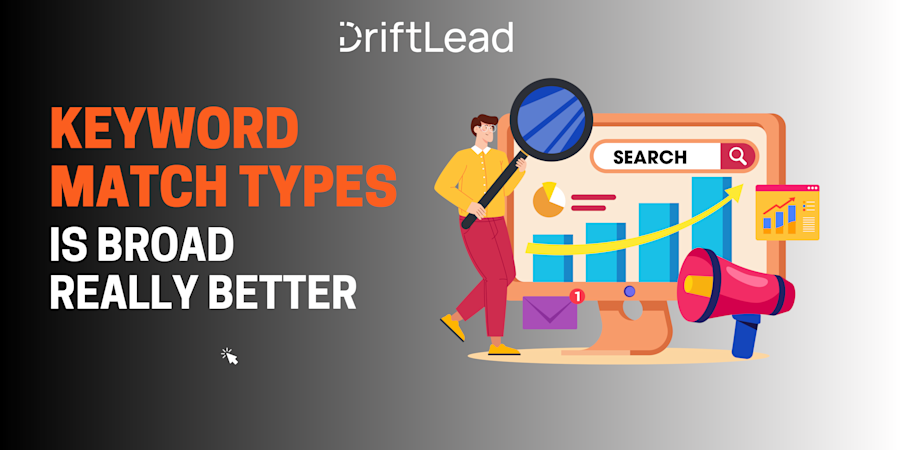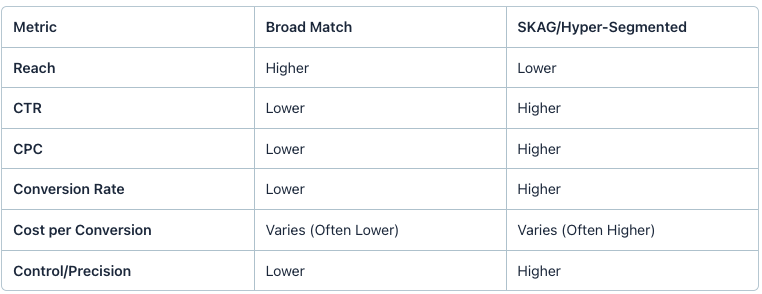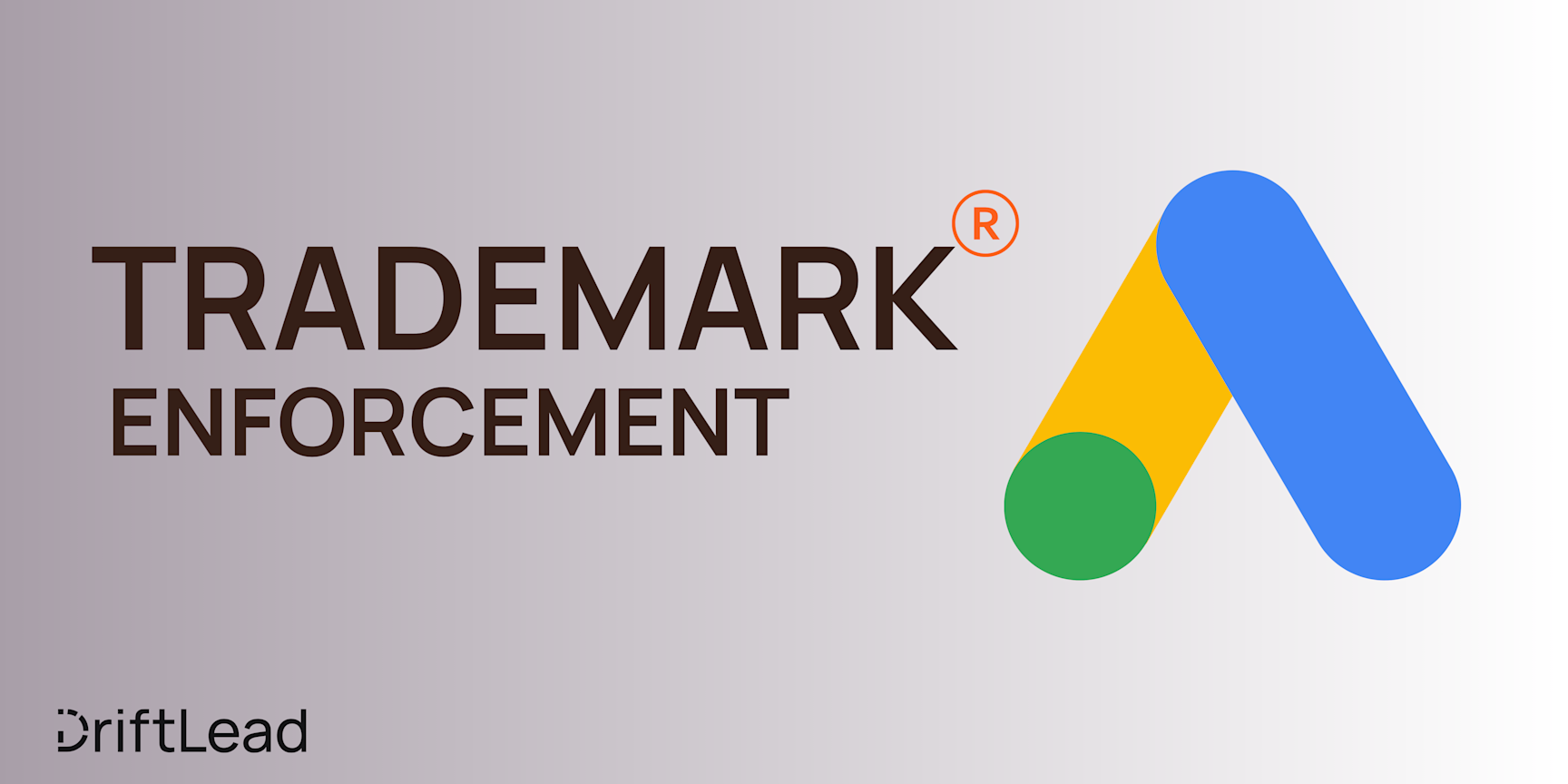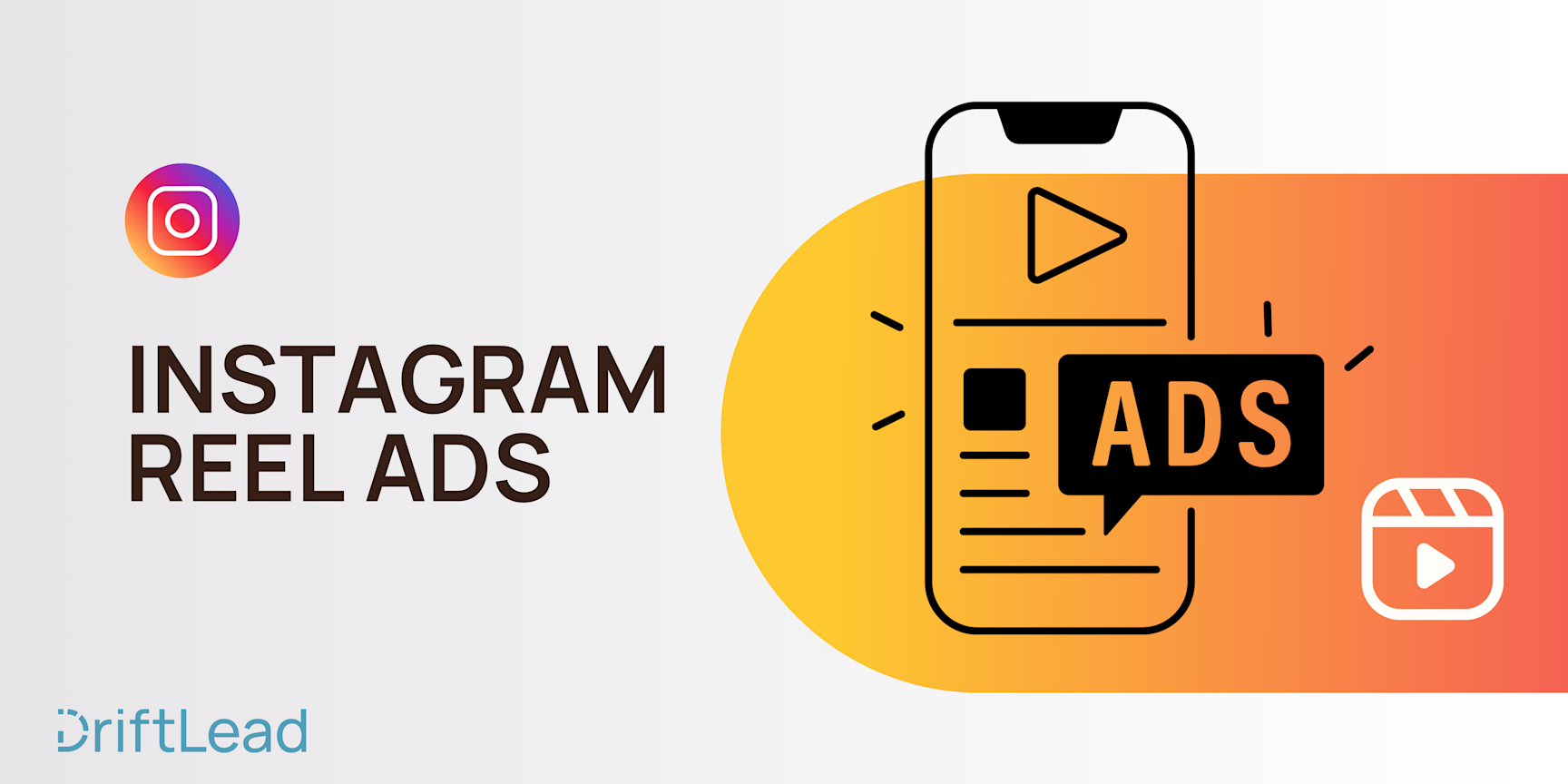Keyword types in Google Ads in 2024: Is Broad Really Best?
25 Oct, 2024
Discover the truth about broad match keywords in Google Ads 2024. Compare performance data, explore hyper-segmentation strategies, and learn how to optimize your PPC campaigns for maximum ROI.

Jump to:
Hop on our weekly newsletter train! We're sharing tips so stellar, we're practically job-threatening ourselves!
As we navigate through 2024, Google's push towards automation and broad match keywords has become increasingly pronounced. But is this shift truly in the best interest of advertisers, or is it merely a convenient narrative for Google? Let's dive deep into the data and examine the pros and cons of different keyword strategies to determine the optimal approach for PPC managers.
The Rise of Broad Match and Automated Bidding
Google has been aggressively promoting the use of broad match keywords in conjunction with automated bidding strategies. Their argument is compelling on the surface:
Increased reach and potential for new, relevant queries 🎯
Simplified account management 🛠️
Leveraging Google's machine learning capabilities
According to Google's own data, advertisers who switched from exact match to broad match while using Target CPA saw a 35% increase in conversions. However, in practice, this may not be the case. 🤔
Broad Match Performance Metrics: Claims vs. Reality 📊
Google's Claim: Advertisers who switched from exact match to broad match while using Target CPA saw a 35% increase in conversions
Reality: According to a comprehensive study by Optmyzr across over 2,600 PPC accounts
70.79% of accounts had better Cost Per Acquisition (CPA) with exact match keywords
72.52% of accounts achieved better Return on Ad Spend (ROAS) with exact match
56.73% of accounts saw higher conversion rates with exact match
These findings directly contradict Google's blanket claims about broad match superiority.
Click-Through Rate (CTR) and Quality
Google's Implication: Broad match provides wider reach and better performance.
Reality: The Optmyzr study revealed that 85.65% of accounts had better CTR with exact match keywords. This suggests that exact-match keywords are generally more relevant to users, resulting in higher-quality traffic.
Cost Per Click (CPC)
Google's Claim: Broad match can lead to lower CPCs.
Reality: 56.55% of accounts in the study had better CPC with exact match keywords. While broad match can sometimes result in lower CPCs due to less competition for certain queries, this often comes at the expense of relevance and quality.
Benefits of Broad Match Targeting
Despite the contradictory data, broad match does offer some advantages:
Wider Reach: Broad match can help discover new, relevant queries that you might not have considered
Time Efficiency: It can save time in keyword research and campaign setup, especially for larger accounts
Potential for Discovery: In some cases, broad match can uncover valuable long-tail keywords or new market segments
Leveraging AI: Google's machine learning can potentially find relevant matches based on various signals beyond just the keyword itself
Downsides of Broad Match Targeting
However, the drawbacks of broad match are significant:
Lower Relevance: Broad match often leads to ads showing for irrelevant searches, potentially wasting budget on unqualified clicks
Reduced Control: Advertisers have less control over exactly when their ads appear, which can be problematic for brands with specific messaging requirements
Potential for Higher Costs: While CPCs might be lower, the overall cost per conversion can be higher due to lower relevance and conversion rates
Diluted Performance Data: The wide variety of matched queries can make it harder to identify truly high-performing keywords
Brand Safety Concerns: Ads might appear for unintended or inappropriate queries, potentially harming brand image
The Case for Hyper-Segmentation
Despite Google's push, many experienced PPC managers still advocate for more granular control through strategies like Single Keyword Ad Groups (SKAGs) or tightly themed ad groups. Let's examine the data:
SKAG Performance
A recent study across multiple accounts revealed that SKAGs consistently outperformed broader structures in terms of Quality Score and Cost Per Click (CPC).
Exact match keywords in SKAGs had the highest click-through rate (CTR)
Broad match had the lowest CPC but also the lowest conversion rate
Surprisingly, broad match showed the lowest cost per conversion, likely due to the significantly lower CPC offsetting the lower conversion rate
This data suggests that while broad matches can be cost-effective, they may come at the expense of precision and control.
Comparing Strategies: Broad Match vs. Hyper-Segmentation

The Hidden Costs of Broad Match
While broad match may seem attractive due to its lower CPC and potentially lower cost per conversion, it's important to consider the hidden costs:
Irrelevant Traffic: Broad match can lead to clicks from users with less intent, potentially wasting budget on non-converting traffic.
Brand Dilution: Showing ads for less relevant queries may negatively impact brand perception.
Loss of Insights: With less granular data, it becomes harder to identify specific high-performing keywords or queries.
Optimizing for 2024: A Hybrid Approach
Given the complexities of modern PPC management, a nuanced approach is often the most effective:
Tiered Match Type Strategy: Use a combination of match types, with broad match for discovery and exact/phrase match for proven performers.
Smart Segmentation: Instead of full SKAGs, consider Single Theme Ad Groups (STAGs) to balance granularity with signal strength for machine learning.
Robust Negative Keyword Lists: Crucial for maintaining relevance when using broad match.
Regular Search Term Analysis: Consistently review search terms to identify new opportunities and irrelevant queries.
Performance-Based Automation: Utilize automated bidding, but set clear performance thresholds for manual review.
Conclusion: The Informed PPC Manager's Approach
While Google's broad match and automated bidding strategies offer convenience and potential for discovery, they should not be adopted blindly. The data shows that hyper-segmented approaches like SKAGs still have merit, particularly in terms of ad relevance and CTR.
The optimal strategy for 2024 likely lies in a thoughtful combination of both approaches. Leverage broad match for discovery and expansion, but maintain tight control over core keywords through more granular structures. Regularly analyze performance data and be prepared to adjust your strategy based on actual results rather than blanket recommendations.
If you are looking to optimize your PPC strategy and drive better results? 🚀 DriftLead has been at the forefront of PPC management for over a decade, helping businesses navigate the complexities of Google Ads and achieve superior performance. Our team of experts can provide you with a tailored approach that combines the best of both worlds – leveraging broad match for discovery while maintaining the precision of granular structures.
Take the first step towards transforming your PPC campaigns. Get your free marketing plan from DriftLead today and discover how our expertise can elevate your Google Ads performance. 💡 Visit https://driftlead.com/marketing-plan/ to start your journey towards more effective, data-driven PPC management






